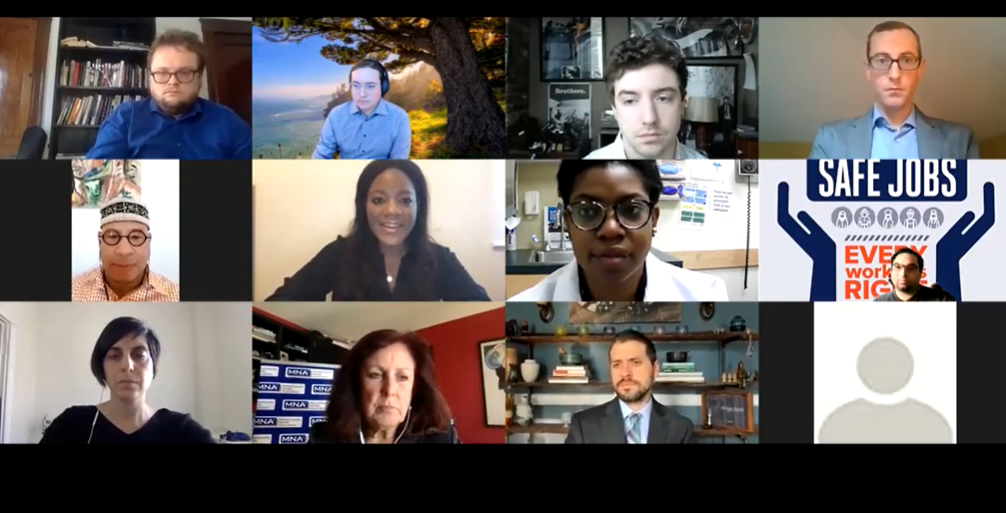Community
Group of Massachusetts physicians, state legislators, community leaders urge Baker to tighten COVID-19 restrictions

Over 20 organizations and nearly 300 physicians, state legislators, community and public health leaders have signed an open letter urging Governor Baker and Massachusetts Legislators demanding a comprehensive response to the current surge of COVID-19. On Tuesday December 22, 2020 the Massachusetts, the Massachusetts Coalition for Health Equity (MCHE) hosted a press conference calling on Governor Charles Baker to shut down non-essential businesses across the state. The Coalition assembled a group of 9 respected speakers who are physicians, local elected officials, activists, and community leaders. Although Governor Baker issued new restrictions in a press briefing today, press conference organizers emphasized that the new recommendations still do not go far enough to protect residents from the virus and the associated economic downturn. The group issued the letter publicly at a virtual press conference on Tuesday, December 22, 2020 at 11 A.M via Zoom.
The group stated that more than half of Massachusetts’ cities and towns in the high-risk zone and COVID-19 case numbers are 70% higher than their peak last April.
“Even as new science shows that indoor dining is unsafe, Governor Baker continues to take piecemeal and inadequate steps needed to curb infection rates, despite repeated warnings of the Center for Disease Control, public health experts, and elected officials.”
“You don’t need an MD or a PhD to know that indoor dining is unsafe,” said Dr. Lara Jirmanus, family physician practicing in Revere and a member of MCHE and press conference organizer. “Talking and eating indoors, unmasked, with people outside of your household is almost guaranteed to spread the virus. Meanwhile, we are nearly a year into this pandemic and Massachusetts is still failing to guarantee broad access to rapid testing and economic relief to enable residents to stay home when they are sick and housing stability to ensure they have a home to stay in. If we want to support local businesses and restaurants, then we should provide them and their employees with relief funding while they are shut down, not put lives at risk by keeping them open.”
“As frontline nurses who are caring for Massachusetts residents impacted by this virus, we join the call for a more aggressive and comprehensive response to this pandemic,” said Katie Murphy, RN, President of the Massachusetts Nurses Association, and signatory of the open letter. “While this administration claims to base its reticence to act to limit public activity based on the “data”, the nurses want the public to know that while the administration surveys data, nurses and other caregivers are viewing a different metric. Ours is the metric of needless human suffering and death of our patients; patients now flooding our emergency departments, filling up our ICUs and other units, patients who come to us after dining in restaurants or working out in gyms or who have been required to teach at or attend schools that should be been closed for in person learning weeks ago.”
“Every day I hear from patients that they are unable to stay home when they are sick, because they will otherwise be unable to pay their rent. Requiring a quarantine after an exposure or positive test is impossible without housing protections, food assistance and emergency sick leave.” said Dr. Mansa Semenya, a family physician practicing in Boston and member of the Massachusetts Coalition for Health Equity (MCHE), which sponsored the letter. “Baker and our state legislators need to pass legislation that allows working people to protect themselves. That is the only way to slow the spread of COVID19 and protect the public health.”
While many set hopes on the COVID-19 vaccine to return to normalcy, the letter signatories warn that control of the COVID-19 infection rates and increased testing remain essential to ending the pandemic.
“Ten months into the pandemic, availability and accessibility of testing is insufficient, workplace protections are insufficient 100,000 households face risk of eviction, and local public health departments are egregiously underfunded.”
“When a COVID-19 outbreak is happening in your workplace, no one should be punished for staying home and staying safe,” said Al Vega, Director of Policy and Programs at the Massachusetts Coalition of Occupational Safety and Health.
“Our community members were struggling for workplace safety even before the pandemic,” said Natalicia Tracy, Executive Director of the Brazilian Workers Center, and press conference speaker. “Now, where many frontline workers’ families cannot eat if they don’t work, employers are exploiting peoples’ needs by ignoring safety. Employers know that the Baker administration never issued binding COVID-19 regulations and no violations will ever be punished. Workplace infections are driving the pandemic in our state and the disproportionate sickness and death among our community. This is what racism looks like.”
“The time to reform public health policy is now,” said Maddie Ribble, Director of Public Policy for the Massachusetts Public Health Association and press conference speaker. “The state provides no direct funding to municipalities….This is a system marked by inequities, and some communities suffer more than others.”
“We have 100,000 families across the state facing eviction this winter.” said Lady Lawrence Carty, co-founder of Housing=Health and press conference speaker. “We need comprehensive housing stability legislation now! In normal circumstances, an eviction crisis on this scale would be disastrous, but in a pandemic for many families, eviction equals death.”
“A study last month nationwide found that people with intellectual developmental disabilities are three times more likely to die,” said Colin Killick, Executive Director of Disability Policy Consortium, “Even though people with intellectual developmental disabilities are not on the priority list for vaccines.”
Signatories of the open letter criticized Governor Baker for continuing to issue piecemeal restrictions, while continuing to blame personal responsibility for the spread of the virus. “We are making a fundamental decision in our public policy to protect wealth and inequality, at the expense of black lives, people of color and at the expense of working class folks, and that is morally unacceptable,” said Rep Connolly, who issued a call along with other state legislators last week. Representative Connolly provided examples of creative funding solutions or options to take out loans for relief programs, as Minnesota and New Jersey have done, echoing the importance of additional relief funding to help Massachusetts residents comply with COVID restrictions.
Organizers call the Baker administration’s additional caps to 25% capacity insufficient, allowing high-risk activities such as indoor dining to continue even as the state opens field hospitals to treat a spillover of patients from hospitals. The governor and the legislature have also failed to take steps to ensure all residents are able to follow the state’s public health guidance, such as passing comprehensive housing stability legislation, paid emergency sick leave, and providing support to small businesses and employees impacted by COVID-19 related closures.
The signatories on the letter are asking for a multi-pronged approach and have specifically requested Governor Baker and the Legislature to take the following steps designed to controlling the spread of COVID including:
1. Close Indoor Dining, Movie Theaters, Casinos, Places of Worship, Gyms, and Limit restaurants to carry-out only
2.Reinstate the Eviction Moratorium and pass comprehensive housing stability legislation, as a lack of eviction protections is associated with a five-fold increase in COVID-19 mortality
3. Implement a state-level relief package to protect individuals and save small businesses by tapping into remaining CARES act funding, the state’s Rainy Day Fund and by applying for a loan through the Municipal Liquidity Facility
4. Pass Emergency Sick time for patients isolating and quarantining after exposure to COVID-19
5. Increase access to COVID-19 testing, especially in hard-hit communities, and decrease test turnaround time
6. Increase funding to support local public health departments
7. Strengthen mandatory workplace standards, as other states like California have done.
Governor Baker has maintained that he has based his decisions concerning COVID-19 on the data.





You must be logged in to post a comment Login